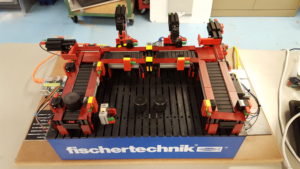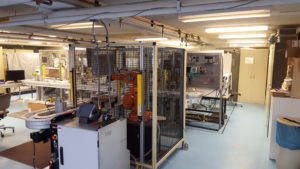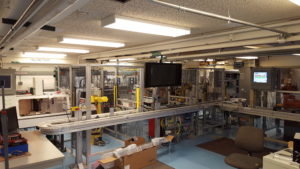System-level Manufacturing and Automation Testbed (SMART)
The System-level Manufacturing and Automation Research Testbed (SMART) is a multidisciplinary testbed used for manufacturing research and education at the University of Michigan. It consists of a physical serial-parallel manufacturing line, an extensive control and sensing network for data acquisition and information transfer, and a cloud database that stores and analyses manufacturing system data. SMART includes two connected conveyor lines, three industrial robots, and four CNC milling machines. It is instrumented with RFID and presence sensors, inspection cameras, and interactive Human-Machine Interface displays. A data pipeline to a cloud infrastructure is used to store and analyze real-time and historical data to better understand the system-level performance of SMART. Simulations that augment and analyze SMART have been used extensively to understand and improve the testbed. SMART has been used to develop and test novel manufacturing technologies, to foster collaborations with industrial partners, to perform multidisciplinary research, and to provide educational opportunities to undergraduate and graduate students at the University of Michigan.
Fischertechnik table-top manufacturing testbed
The Fischertechnik Testbed is a cost-effective, table-top testbed used for smart manufacturing research and education at the University of Michigan. While this testbed is much smaller than SMART, it functionally mimics the main aspects of the larger system. The Fischertechnik Testbed contains infrared sensors and motors to run conveyors and machines that do mock work on parts as they move through the system. The testbed also utilizes for Raspberry PI microcontrollers that operate as Programmable-Language Controllers (PLC), which execute the operating code for the testbed and collect data from the devices on the testbed. Network routers are used to connect these testbeds to a LabVIEW Human-Machine Interface (HMI) via a MODBUS connection. The HMI allows users to monitor the status and productivity of the system, and the HMI creates a local storage spreadsheet for the testbed data. The Fischertechnik Testbed will be used to develop novel reconfiguration algorithms and will be utilized in an educational setting to teach students the fundamentals of smart manufacturing.

Related Publications:
- Kovalenko, I., Saez, M., Barton, K., and Tilbury, D., “SMART: A System-Level Manufacturing and Automation Research Testbed,” Smart and Sustainable Manufacturing Systems, Vol. 1, No. 1, 2017, pp. 232–261, http://dx.doi.org/10.1520/SSMS20170006. ISSN 2165-3992


